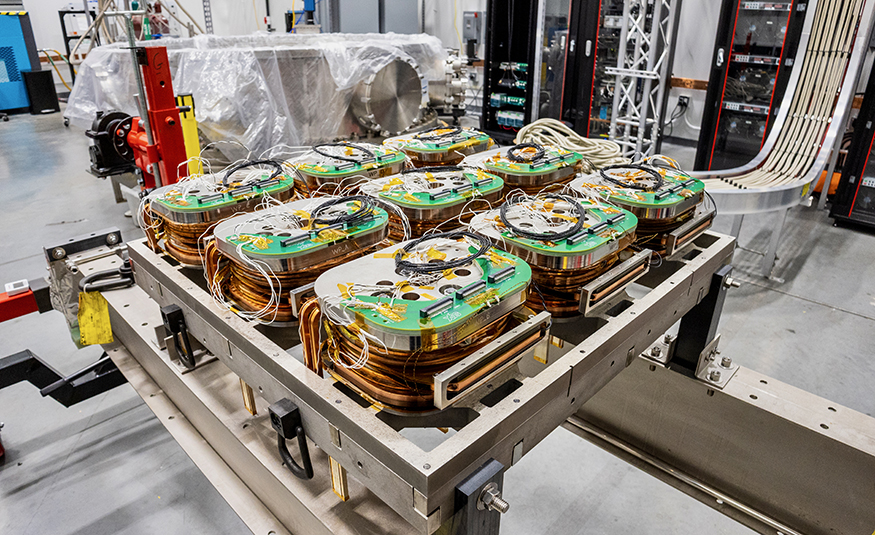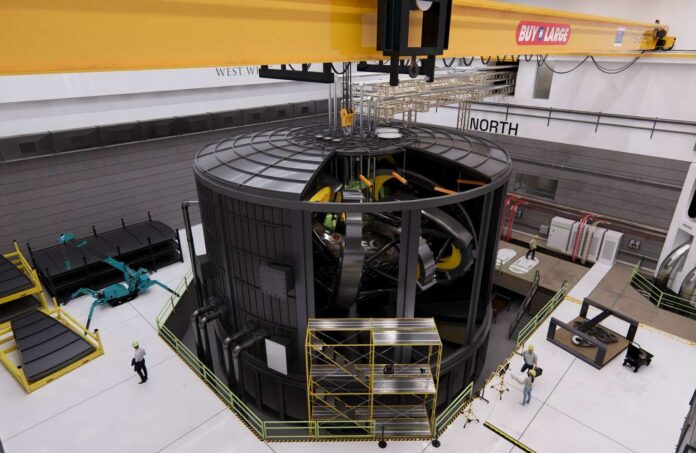Kearny, New Jersey, is quickly becoming a hub for breakthrough clean energy research thanks to Thea Energy, a startup spun out of Princeton University and the Princeton Plasma Physics Laboratory. The three-year-old company is working to make fusion power — the same reaction that powers the stars — a practical and commercial source of clean, limitless energy. With millions of dollars in investment, significant federal support, and new resources from Amazon Web Services, Thea Energy is positioning New Jersey as a leader in the race to develop next-generation energy technology.

Founded in 2022, Thea Energy takes its name from the Greek goddess of light, symbolizing its mission to bring radiance and power to a world searching for sustainable energy solutions. The company’s focus is on advancing stellarator fusion, a form of magnetic confinement fusion technology originally conceived at Princeton in the 1950s. While fusion has long been seen as the “holy grail” of clean energy, the engineering challenges have been immense. Thea Energy is aiming to change that by leveraging cutting-edge computing, streamlined design, and fresh scientific approaches.
A Boost from Amazon and Global Partnerships
Earlier this year, Thea Energy completed a prestigious fellowship hosted by Amazon Web Services (AWS) and the International Research Centre on Artificial Intelligence. The fellowship, part of AWS’s “Compute for Climate” program, offered startups access to advanced cloud computing infrastructure and up to $1.5 million in cloud credits. This partnership allowed Thea Energy’s scientists to scale complex fusion simulations that were previously limited to specialized research computers. Now, using AWS’s global computing network, Thea can test and optimize its systems more efficiently than ever.
As AWS expands its fellowship program, companies like Thea Energy stand out as leaders in using artificial intelligence and cloud computing to accelerate environmental and energy solutions. By transferring the complexity of fusion engineering from hardware to software, Thea’s approach could make fusion systems more scalable and practical to build.
Funding and Federal Support
Since its founding, Thea Energy has raised over $30 million from investors, in addition to grants and awards from the U.S. Department of Energy. The company was also selected for the Department of Energy’s Innovation Network for Fusion Energy program, securing three separate awards in partnership with Princeton Plasma Physics Laboratory and Columbia University. These collaborations focus on improving plasma analysis, advancing high-temperature superconductor technologies, and applying artificial intelligence to speed up plasma modeling.
This federal support demonstrates the strategic importance of fusion research in ensuring U.S. leadership in clean energy. Globally, investment in fusion energy has skyrocketed, with nearly $10 billion pouring into the sector since 2021. Private companies are now moving fusion out of the lab and into the competitive commercial energy space.
The Eos Prototype and Future Helios Power Plant
Thea Energy is currently developing its Eos prototype, named after the daughter of Thea and the goddess of dawn. The system will be based on a proprietary stellarator design known as the planar coil stellarator, which simplifies construction while maintaining strong magnetic confinement. Eos will serve as a proving ground for large-scale fusion and is expected to be operational by 2030. From there, the company plans to move toward its first full-scale power plant, Helios, which takes its name from the Greek sun god.
The goal is nothing short of revolutionary: to create a clean, safe, zero-emission energy source capable of meeting global demand while avoiding the geopolitical and environmental challenges tied to fossil fuels. Unlike traditional nuclear fission, fusion produces no long-lived radioactive waste, making it a far cleaner alternative.
A Home in New Jersey
Earlier this year, Thea Energy celebrated the opening of its new headquarters at Kearny Point, a 15,000-square-foot facility equipped with labs for high-field magnet research, rapid prototyping, and testing. With around 70 employees, including physicists, engineers, and operations staff, the company is actively expanding and expects to double or triple its workforce and lab space in the coming years. The new location allows the team to remain connected to Princeton’s research community while fostering New Jersey’s growing reputation as a hub for technology and clean energy innovation.
The decision to stay in New Jersey also reflects the state’s commitment to supporting emerging technologies. With demand for energy climbing due to artificial intelligence, data centers, and electrification, fusion power could become a critical resource. A future Helios plant built in New Jersey would mark the state as a global center for clean energy production.
The Broader Promise of Fusion
Fusion’s potential extends beyond just electricity. Experts note that fusion could provide industrial heat, support data centers, and offer base-load energy that complements renewable sources like wind and solar. Because fusion relies on hydrogen — one of the most abundant elements in the universe — it avoids the resource constraints and political tensions tied to fossil fuels.
For Thea Energy, this vision is about more than science. It is about creating a practical, scalable system that can power communities, industries, and technology infrastructure in ways that transform society. As one of the company’s leaders explained, fusion’s promise is to create abundant energy that supports innovation, food security, and healthier lives worldwide.
Looking Ahead
The road to commercial fusion is still challenging, but Thea Energy’s progress in such a short time has impressed both investors and government partners. With its partnership with AWS, growing team in Kearny, and upcoming prototype development, the company is setting ambitious milestones for the next decade. By 2030, the world could see a working Eos system, followed by Helios power plants that redefine how we think about energy production.
For New Jersey, this is an opportunity not just to host another promising technology company, but to lead in a field that could change the global energy landscape. Fusion power is often described as “star power on Earth,” and with Thea Energy’s work, that future feels closer than ever. To keep up with more on groundbreaking innovation and energy technology in the state, visit Explore New Jersey’s Technology section.












